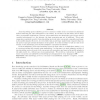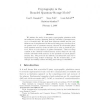25 search results - page 3 / 5 » Breaking a Cryptographic Protocol with Pseudoprimes |
IACR
2011
12 years 7 months ago
2011
A zero-knowledge protocol allows a prover to convince a verifier of the correctness of a statement without disclosing any other information to the verifier. It is a basic tool a...
ESORICS
2005
Springer
14 years 28 days ago
2005
Springer
Abstract. Formal methods have been extensively applied to the certification of cryptographic protocols. However, most of these works make the perfect cryptography assumption, i.e....
FOCS
2005
IEEE
14 years 1 months ago
2005
IEEE
We initiate the study of two-party cryptographic primitives with unconditional security, assuming that the adversary’s quantum memory is of bounded size. We show that oblivious ...
TYPES
2004
Springer
14 years 22 days ago
2004
Springer
Abstract. Most approaches to the formal analysis of cryptography protocols make the perfect cryptographic assumption, which entails for example that there is no way to obtain knowl...
CORR
2010
Springer
13 years 7 months ago
2010
Springer
Quantum Cryptography or Quantum key distribution (QKD) is a technique that allows the secure distribution of a bit string, used as key in cryptographic protocols. When it was note...


